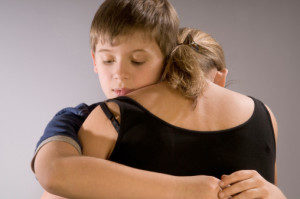How to Apologize When You’ve Hurt Your Child’s Feelings: Recovering after a Fight

We all have those moments when something goes wrong and we start pointing the finger to figure out whose “fault” it is. When this happens, there are many times when we just need to let the other person vent. There are other times when we need to “own” our part in the situation. Whenever I have an argument or lose my temper with my kids (or my spouse), I try to take the time, once I've calmed down, to sincerely apologize. Even if they “started it,” I believe it is my job as the parent to stay calm. If I'm not successful in doing that (I am human after all), then they deserve an apology.
Not only does this model “taking responsibility” for our kids, but it can help them in many life situations. We live in a world where pointing the finger is the norm. Learning how to gracefully and authentically apologize is an important, relationship-sustaining tool.
Article continues below...
Minimize Meltdowns!
Download a free tipsheet "Top 10 Ways to Stop Meltdowns in Their Tracks" to stop yelling and tantrums from everyone!
Hurt Feelings
Sometimes, even when we try to be conscious parents, we inadvertently hurt our kids' feelings. We don't do it on purpose, of course. We say something. They interpret it. The next thing we know, they are upset. Maybe they have reason to be, maybe not. Doesn't matter much. Because once they're upset, that deserves our attention. And your relationship will improve a lot if you learn how to apologize in a way that works for them.
So How Do You Apologize?
When kids' feelings are hurt, it can interfere with their ability to do just about anything because it threatens their ability to trust. So how can you mend their hurt feelings and rebuild their trust?
- Take time to really listen. I take the time to curl up on the couch with my son (he still loves to snuggle, sometimes), acknowledge his feelings, and see what's really going on for him. Before you respond with something reactive like, “No, I didn't mean that,” it's important to slow down and really understand their feelings. Ask them what happened from their perspective – and try to stay off the defensive! Listening makes people feel loved.
- Apologize, sincerely, even if you didn't intend to upset them. I'm genuinely sorry when my kids misunderstand something that causes them pain – and I make sure to send that message loud and clear. When we get caught up in who's "fault" it is, it interferes with relationships and prevents us from really connecting with each other. Focus more on your intention instead of who did what to whom.
- Go overboard with praise. Make an effort to acknowledge good behaviors and praise more than you correct. I once read an article that said to have a successful relationship, the ratio needs to be five positive comments to every corrective/negative one. That's really hard to do, even when you are trying. And while I know it's not exactly the first thing you're focusing on when feelings are hurt, it helps to set the stage for staying connected when those moments of tension occur.
So let's be clear – even parents who intend to be conscious in their relationships with their kids struggle with how to set expectations, and how to apologize. So there's one last thing you have to do: forgive yourself. Know that sometimes things don't play out the way we intend. That's the reality of life. It's great for our kids to learn that. And great for us to model the process of learning to accept it.
Here's the good news: making up for it can be awfully fun – and a good excuse to reconnect with your child.

